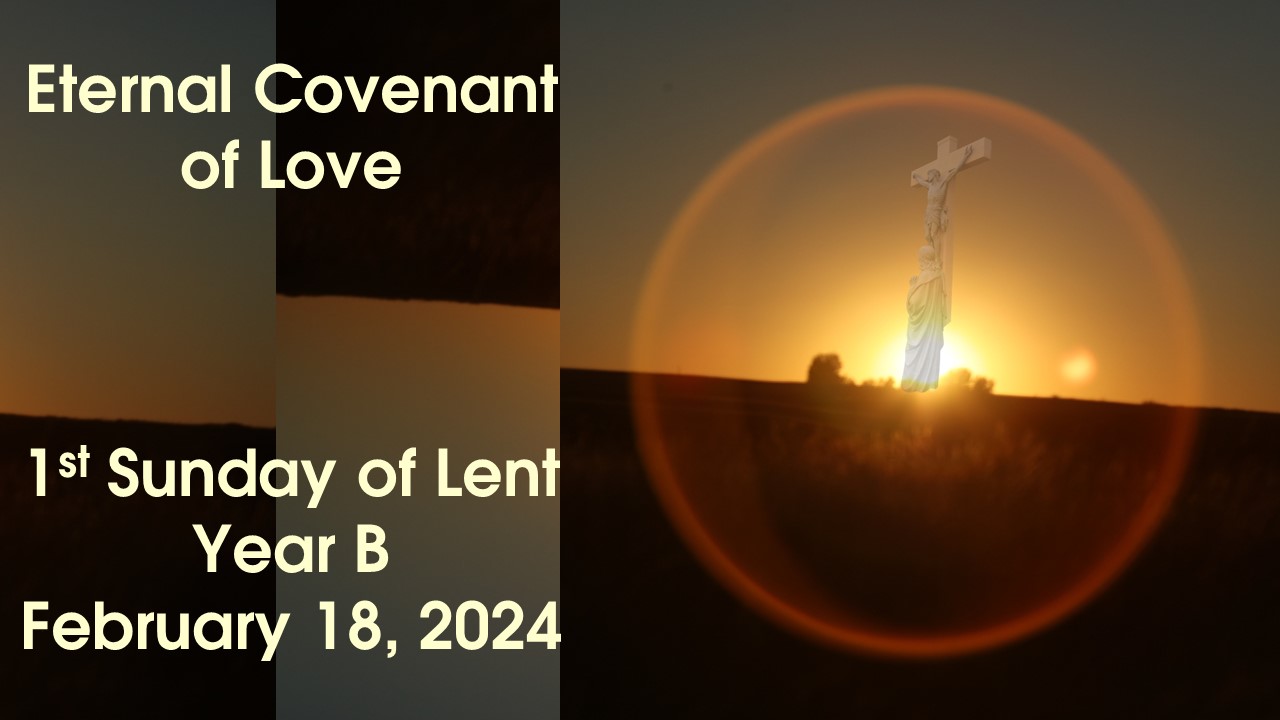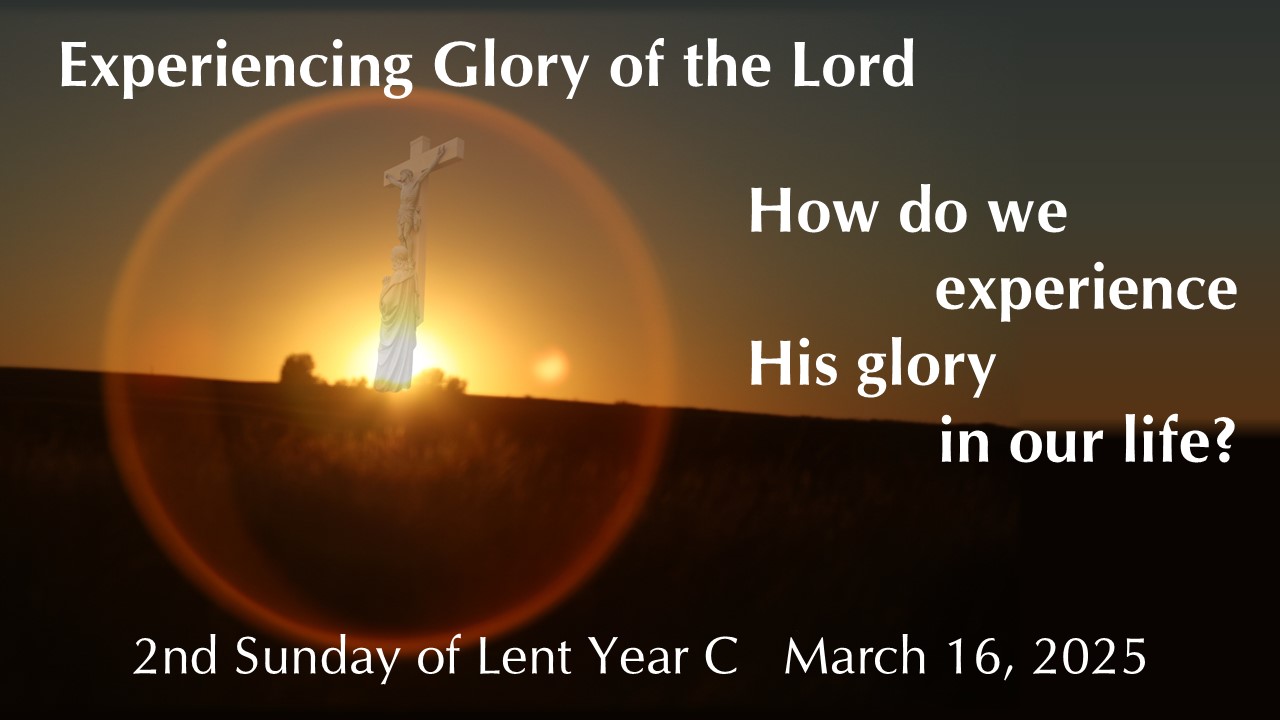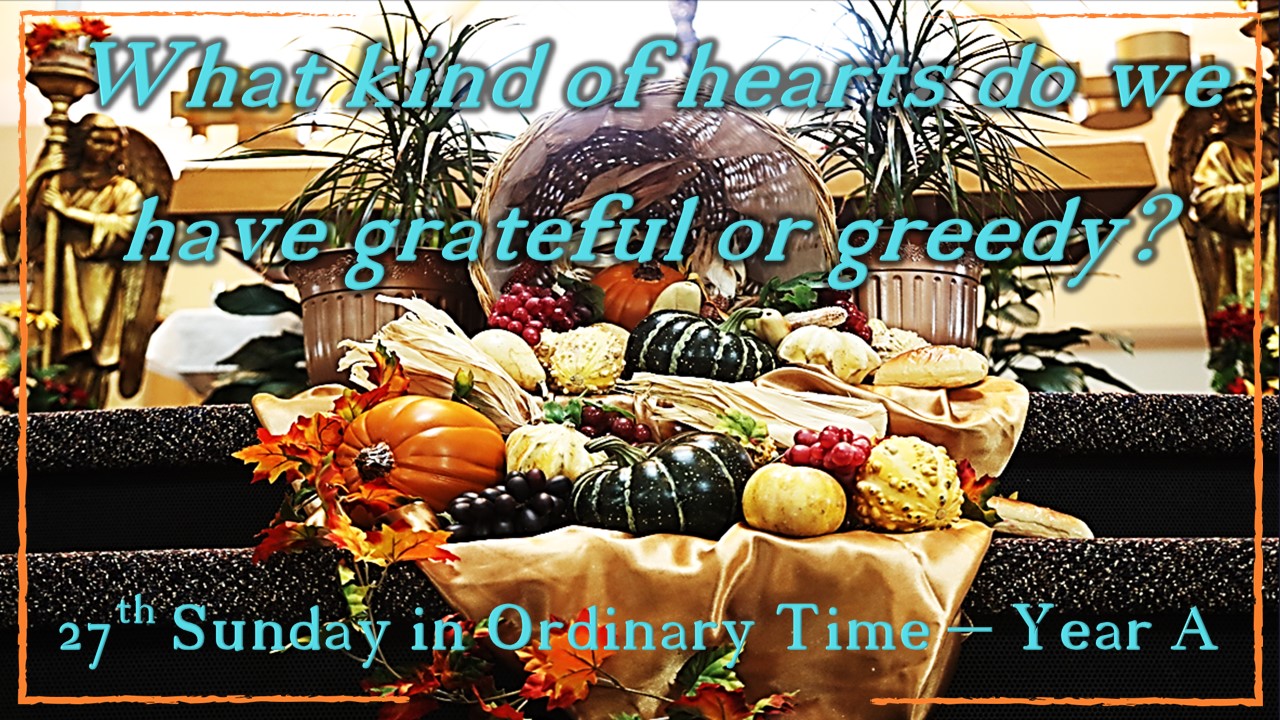
1st Sunday of Lent – Year B ~ February 18, 2024
Eternal Covenant of Love
Two men, both seriously ill, occupied the same hospital room. One man was allowed to sit up in his bed for an hour each afternoon to help drain the fluid from his lungs. His bed was next to the room’s only window. The other man had to spend all his time flat on his back. The men talked for hours on end. They spoke of their wives and families, their homes, their jobs, their military service, where they had been on holidays. Every afternoon when the man in the bed by the window could sit up, he would pass the time by describing to his roommate all the things he could see outside the window. The man in the other bed began to live for those one-hour periods where his world would be broadened and enlivened by all the activity and colour of the world outside.
The window overlooked a park with a lovely lake. Ducks and swans played on the water while children sailed their model boats. Young lovers walked arm in arm amidst flowers of every color and a fine view of the city skyline could be seen in the distance. As the man by the window described all this in exquisite detail, the man on the other side of the room would close his eyes and imagine the picturesque scene.
One warm afternoon the man by the window described a parade passing by. Although the other man couldn’t hear the band – he could see it. In his mind’s eye as the gentleman by the window portrayed it with descriptive words. Days and weeks passed.
One morning, the day nurse arrived to bring water for their baths only to find the lifeless body of the man by the window, who had died peacefully in his sleep. She was saddened and called the hospital attendants to take the body away.
As soon as it seemed appropriate, the other man asked if he could be moved next to the window. The nurse was happy to make the switch, and after making sure he was comfortable, she left him alone. Slowly, painfully, he propped himself up on one elbow to take his first look at the real world outside.
He strained to slowly turn to look out the window beside the bed. It faced a blank wall. The man asked the nurse what could have compelled his deceased roommate who had described such wonderful things outside this window. The nurse responded that the man was blind and could not even see the wall. She said, “Perhaps he just wanted to encourage you.”
God cheers every hearth who comes to him through his Son who gave to give eternal life.
As we begin our Lenten Season, we are invited to reflect on the Covenant which God made with Noah and fulfilled in Jesus. It is a covenant where God promises that He will never forget us, nor any of the creatures that he made. It is a covenant that promises that God will never again destroy the earth because of the sinfulness of man, and as a sign of this covenant this promise God creates the rainbow so that whenever it is raining God and all of us here who see it will remember that promise.
The beautiful thing about this covenant, this agreement that God made is that it has no conditions upon it. It is a covenant without any “if” clauses, such as “if you love me” or “if you obey me” or “if you worship me” or if you brush your teeth or help old ladies across the street – then I will be good to you! No – the covenant God made Noah is an unconditional covenant. It is a covenant of love wherein God promises to remember us even if we forget him.
That is what God’s love is like. He remembers us even when we forget him. St. Paul writing to Timothy says “Therefore I endure everything for the sake of the elect, so that they may also obtain the salvation that is in Christ Jesus, with eternal glory. The saying is sure: If we have died with him, we will also live with him;
if we endure, we will also reign with him; if we deny him, he will also deny us;
if we are faithless, he remains faithful—for he cannot deny himself”.
St. Leo the Great says “Dear friends, at every moment the earth is full of the mercy of God, and nature itself is a lesson for all the faithful in the worship of God. The heavens, the sea and all that is in them bear witness to the goodness and omnipotence of their Creator, and the marvelous beauty of the elements as they obey him demands from the intelligent creation a fitting expression of its gratitude. But with the return of that season marked out in a special way by the mystery of our redemption, and of the days that lead up to the paschal feast, we are summoned more urgently to prepare ourselves by a purification of spirit. The special note of the paschal feast is this: the whole Church rejoices in the forgiveness of sins. It rejoices in the forgiveness not only of those who are then reborn in holy baptism but also of those who are already numbered among God’s adopted children.
Initially, men are made new by the rebirth of baptism. Yet there still is a required daily renewal to repair the shortcomings of our mortal nature, and whatever degree of progress has been made there is no one who should not be more advanced. All must therefore strive to ensure that on the day of redemption no one may be found in the sins of his former life. Dear friends, what the Christian should be doing at all times should be done now with greater care and devotion, so that the Lenten fast enjoined by the apostles may be fulfilled, not simply by abstinence from food but above all by the renunciation of sin”.
There is no more profitable practice as a companion to holy and spiritual fasting than that of almsgiving. This embraces under the single name of mercy many excellent works of devotion, so that the good intentions of all the faithful may be of equal value, even where their means are not. The love that we owe both God and man is always free from any obstacle that would prevent us from having a good intention. The angels sang: Glory to God in the highest, and peace to his people on earth. The person who shows love and compassion to those in any kind of affliction is blessed, not only with the virtue of good will but also with the gift of peace.
The works of mercy are innumerable. Their very variety brings this advantage to those who are true Christians, that in the matter of almsgiving not only the rich and affluent but also those of average means and the poor are able to play their part. Those who are unequal in their capacity to give can be equal in the love within their hearts.
Prophet Isaiah does confirm the unconditional covenant of God with his people that he will never forget them; “But Zion said, “The Lord has forsaken me, my Lord has forgotten me.” Can a woman forget her nursing child, or show no compassion for the child of her womb? Even these may forget, yet I will not forget you. See, I have inscribed you on the palms of my hands; your walls are continually before me. No matter what we have done -when we stand at the door and knock, God won’t ask “who’s there” he will instead open the door and welcome us in. Despite our sinfulness, despite all that we do to hurt each other and to hurt ourselves, God has promised not to abandon us, to not forget us and seek our destruction, but rather to remember us and his love for us. This is the meaning of the covenant sealed with a rainbow, and this is the meaning of all God’s covenants with us.
Abraham was chosen by God to raise up a great nation, so that the world would be blessed by a Holy People. David’s children were chosen by God to be Kings over Israel, so that one day the world might be saved by a Messiah. And Jeremiah was chosen to announce a new covenant, where God would place the Law in each person’s heart and where each person might personally come to know God and his salvation.
That last covenant, the once announcement by Jeremiah, has been fulfilled, and each of us here is now privileged, if we so choose, to be a part of that covenant, a covenant that is signed by the cross of Jesus and sealed by our baptism into his death and resurrection. God sent his Son instead of a flood to deal with our sin, and he died for our sin – the righteous for the unrighteous, to bring us to God and to allow us to live well both now and forever.
Holy Father Pope Francis reflecting on the Gospel says “St Mark writes in today’s Gospel: “The Spirit immediately drove him out into the wilderness. And he was in the wilderness forty days, tempted by Satan; and he was with the wild beasts; and the angels ministered to him”. With these simple words the Evangelist describes the trials willingly faced by Jesus before he began his messianic mission. It is a trial from which the Lord leaves victorious and which prepares him to proclaim the Gospel of the Kingdom of God. In these 40 days of solitude, he confronts Satan “body to body”, He unmasks his temptations and conquers him. And through Him, we have all conquered, but we must protect this victory in our daily lives”.
However, most of the times we fail and give ourselves to temptations, but the Lord shows his mercy and redemption everyday in our lives. The following story will help us to understand that Jesus being our covenant how he saves us.
There once was a man named Soul who was walking in a garden. He was whistling a real sweet tune for he was saved and had the joy of the Lord, but he was a baby Christian. As Soul was walking, a beautiful and seductive woman came out from behind a tree. Soul was very startled. He said, “Hello, I’m Soul, what is your name?”
She replied, “I am Temptation, I have what you want.” “What do I want?” replied Soul. “You want to do all things which are of the flesh,” said Temptation. Soul replied, “O.K., lead me.” He and Temptation went off and fulfilled the desires of the flesh. When Soul returned to the garden, he met a man named Condemnation. Condemnation said, “Hey, I see you have met my friend, Temptation.” Soul said, “Yes, who are you?” “I am Condemnation, I come after Temptation. We work hand-in-hand.” Then Condemnation jumped on Soul’s back and began to beat him. He hit him in the face and kicked him when he was down. This went on for several days. On about the third day, a man named Mercy came running and said, “I command you, Condemnation, to stop beating Soul.” Condemnation snickered, “Make me.” Mercy unsheathed his sword and cut Condemnation in two. As Soul watched in astonished pain, he was overtaken by the power of Mercy. Mercy walked up to Soul and said, “I have dealt with Condemnation before. He should not show up around you anymore.” Soul replied, “How can I ever thank you?” “Well,” replied Mercy, “I was sent here by God and He told me to introduce you to a dear friend of mine. His name is Redemption.” Redemption walked up and said, “Hello Soul, I see that you are not doing well.” Soul replied, “Not until Mercy came along. It is a pleasure to meet you Redemption.” “Well”, said Redemption,” I am glad to meet you. Are you ready to accept me?” “What do you mean?” asked Soul. Redemption said, “Well, when you accepted Jesus and decided to walk with Him, then you chose to accept the things of Him and His love. I am a part of Jesus’ love. I help you feel forgiven. You will never have to deal with Condemnation again. Temptation may come around, but I have someone I would like for you to meet who can help you with that. His name is Grace.” Grace walked up to Soul and said, “Hello Soul, I have been waiting for you. As a matter of fact, all three of us have been waiting to meet you. I will help you take the way out of Temptation that God gives you as it comes up. The last person we want you to meet is Faith.” “Hi Soul, I am Faith, and I will help you stay strong and keep your beliefs strong,” said Faith. Soul began to cry. When he began to cry Redemption said, “This is what we are here for. Jesus redeemed you, saved you by Grace through Faith and gives you his Mercy. Jesus loves you Soul.” Soul said, “I love you, Jesus.”
What a great message this story contains for us as we begin our Lenten journey to grow deeper in our faith. We could see the price of our redemption through the eyes of Prophet Isaiah (53:4-7) “Surely he has borne our infirmities and carried our diseases; yet we accounted him stricken, struck down by God, and afflicted. But he was wounded for our transgressions, crushed for our iniquities; upon him was the punishment that made us whole, and by his bruises we are healed. Are we like sheep gone astray; we have all turned our own way, and the Lord has laid down the iniquity of us all. He was oppressed, and he was afflicted, yet he did not open his mouth; like a lamb that is led to the slaughter, and like a sheep that before its shearers is silent, so he did not open his mouth.”
Jesus being our covenant, immediately following the temptations in the desert, he begins to preach the Gospel: The time is fulfilled, and the kingdom of God has come near; repent and believe in the good news. The time is fulfilled because in Jesus God has completed the covenant made with Noah that is not to destroy the world again due to sin. Jesus being our covenant invites everyone to repent and believe. What does it mean?
In fact, we are never sufficiently orientated towards God, and we must continually direct our minds and our hearts towards him. To do this, we need to have the courage to reject all that takes us off course, the false values which deceive us, by subtly flattering our ego. Rather, we must entrust ourselves to the Lord, to his goodness and to his project of love for each of us. Lent is a time of repentance, yes, but it is not a time of sorrow! It is a time of penance, but it is not a time of sorrow, of mourning. It is a joyous and serious commitment to strip ourselves of our selfishness, of our “old person”, and to renew ourselves according to the grace of our Baptism.
This Gospel highlights for us one of the central themes of the Season of Lent. We are dependent upon God for all that we have and all that we are. Anything that leads us to reject this dependency or to distrust its sufficiency, is a temptation from the devil. Jesus knows that he will be tempted again in the Garden of Gethsemane. The depth of Jesus’ trust in God is shown most fully when Jesus rejects the temptation to turn away from the task God has given to him.
Jesus’ response to the temptations of the devil teaches us how we can respond to temptation. As we start our journey through Lent, this Sunday’s Gospel calls us to adopt the same confidence that Jesus had in the face of temptation: God’s word alone will suffice, God’s promise of protection can be trusted, and God alone is God. St. Peter encourages everyone to stand against the temptations and the power of the devil: “Humble yourselves therefore under the mighty hand of God, so that he may exalt you in due time. Cast all your anxiety on him because he cares for you. Discipline yourselves, keep alert. Like a roaring lion your adversary the devil prowls around, looking for someone to devour. Resist him, steadfast in your faith, for you know that your brothers and sisters in all the world are undergoing the same kinds of suffering. And after you have suffered for a little while, the God of all grace, who has called you to his eternal glory in Christ, will himself restore, support, strengthen, and establish you. To him be the power forever and ever. Amen”.
Jesus shows us the way out of our temptations and trials of daily life, how to be strong and make sure to preach the Good News to everyone but especially to those who feel rejected. God does not make the covenant with the powerful but with the repentant who trust in him as Noah did. God does not forget his covenant though we may.
One Easter Sunday morning, a pastor came to the Church carrying a rusty, bent, old bird cage, and set it by the pulpit. Several eyebrows were raised and, as if in response, the pastor began to speak.
“I was walking through town yesterday when I saw a young boy coming toward me, swinging this bird cage. On the bottom of the cage were three little wild birds, shivering with cold and fright. I stopped the lad and asked, “What you got there, son?”
“Just some old birds,” came the reply.
“What are you gonna do with them?” I asked.
“Take ’em home and have fun with ’em. I’m gonna tease ’em and pull out their feathers to make ’em fight. I’m gonna have a real good time.”
“But you’ll get tired of those birds sooner or later. What will you do then?”
“Oh, I got some cats. They like birds. I’ll feed ’em to them.”
The pastor was silent for a moment. “How much do you want for those birds, son?”
“Huh??!!! Why, you don’t want them birds, mister. They’re just plain old field birds. They don’t sing – they ain’t even pretty!”
“How much?”
The boy sized up the pastor as if he were crazy and said, “$10?”.
The pastor reached in his pocket and took out a ten-dollar bill. He placed it in the boy’s hand. In a flash, the boy was gone.
The pastor picked up the cage and gently carried it to the end of the alley where there was a tree and a grassy spot. Setting the cage down, he opened the door, and by softly tapping the bars persuaded the birds out, setting them free.
Well, that explained the empty bird cage on the pulpit, and then the pastor began to tell this story.
One day Satan and Jesus were having a conversation. Satan had just come from the Garden of Eden, and he was gloating and boasting.
“Yes, sir, I just caught the world full of people down there. Set me a trap, used bait I knew they couldn’t resist. Got ’em all!”
“What are you going to do with them?” Jesus asked.
“Oh, I’m gonna have fun! I’m gonna teach them how to marry and divorce each other. How to hate and abuse each other. How to drink and smoke and curse. How to invent guns and bombs and kill each other. I’m really gonna have fun!”
“And what will you do when you get done with them?”, Jesus asked.
“Oh, I’ll kill ’em.”
“How much do you want for them?”
“Oh, you don’t want those people. They ain’t no good. Why, you take them and they’ll just hate you. They’ll spit on you, curse you and kill you!! You don’t want those people!!”
“How much?”
Satan looked at Jesus and sneered, “All your tears, and all your blood.” Jesus paid the price.
The pastor picked up the cage he opened the door and he walked from the pulpit.
God’s covenant is fulfilled on the Cross through his Jesus who died upon it to save us and to grant eternal life and he will never forget it. What is our stand?
Other Sermons In This Series

2nd SUNDAY OF LENT – YEAR C ~ MARCH 16, 2025
March 13, 2025

REFLECTION FOR ALL SUNDAYS ~ YEAR B ~ JULY, 2024
July 04, 2024

27th Sunday in Ordinary Time – Year A ~ October 8, 2023
October 06, 2023

